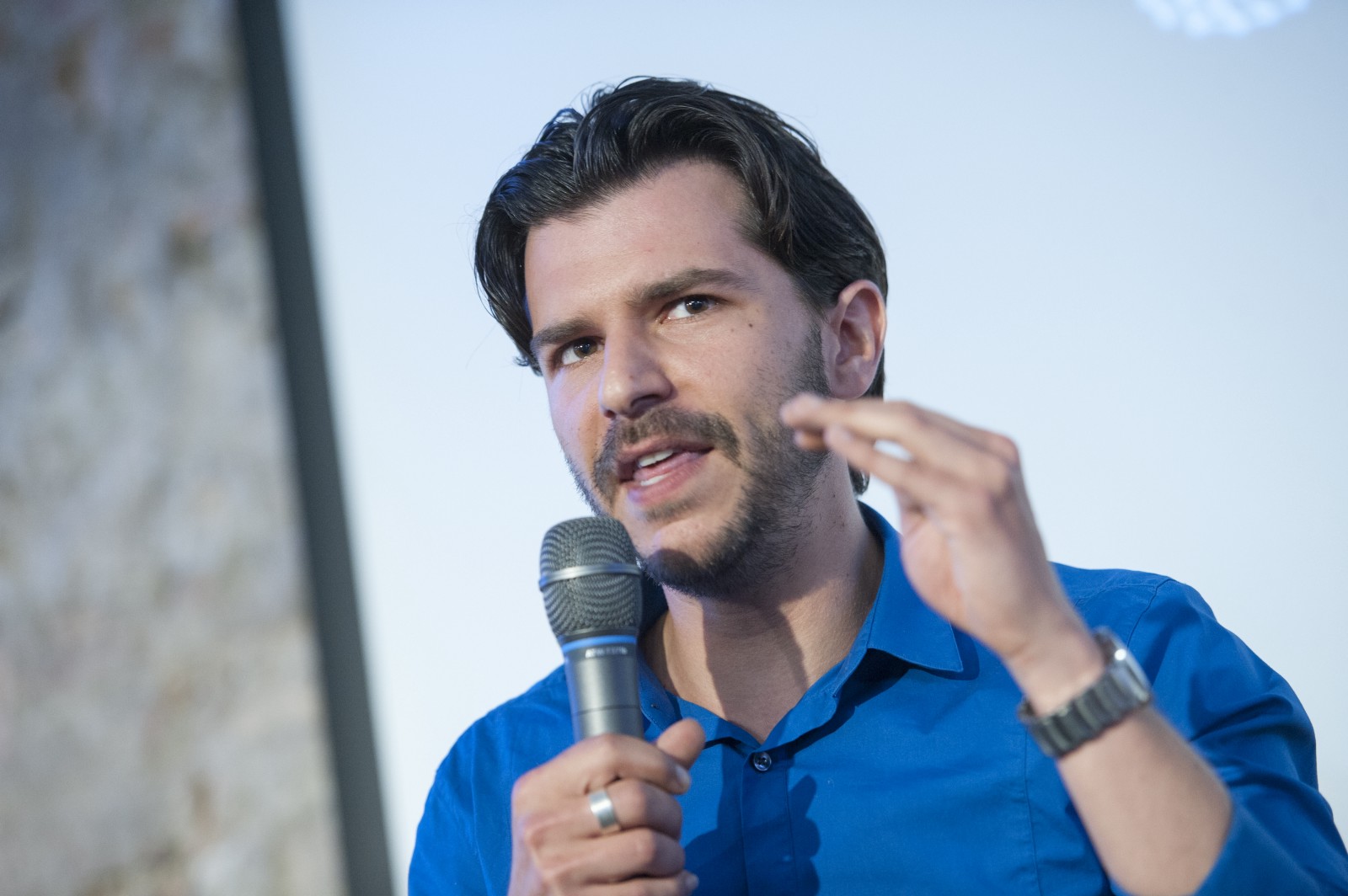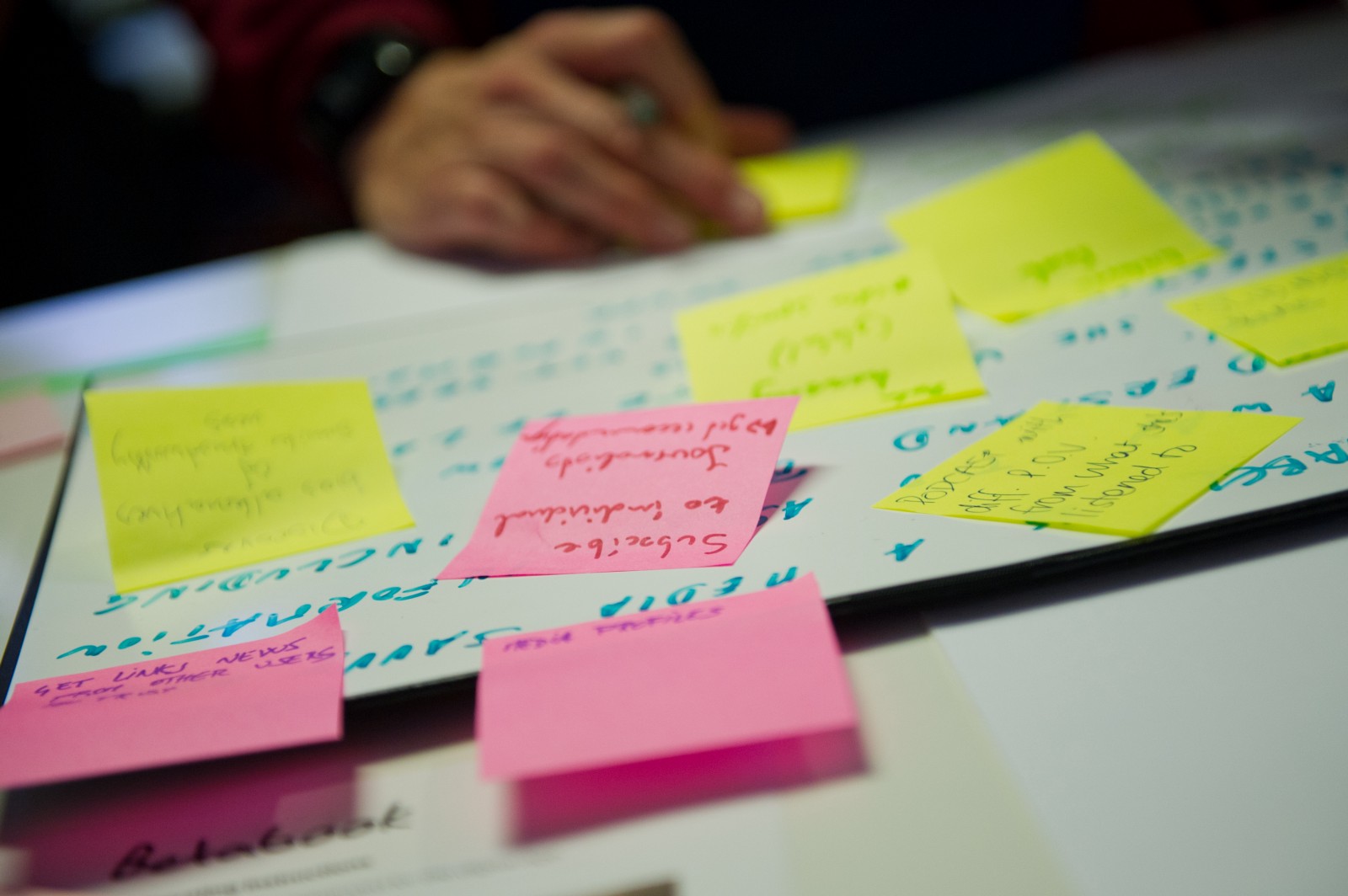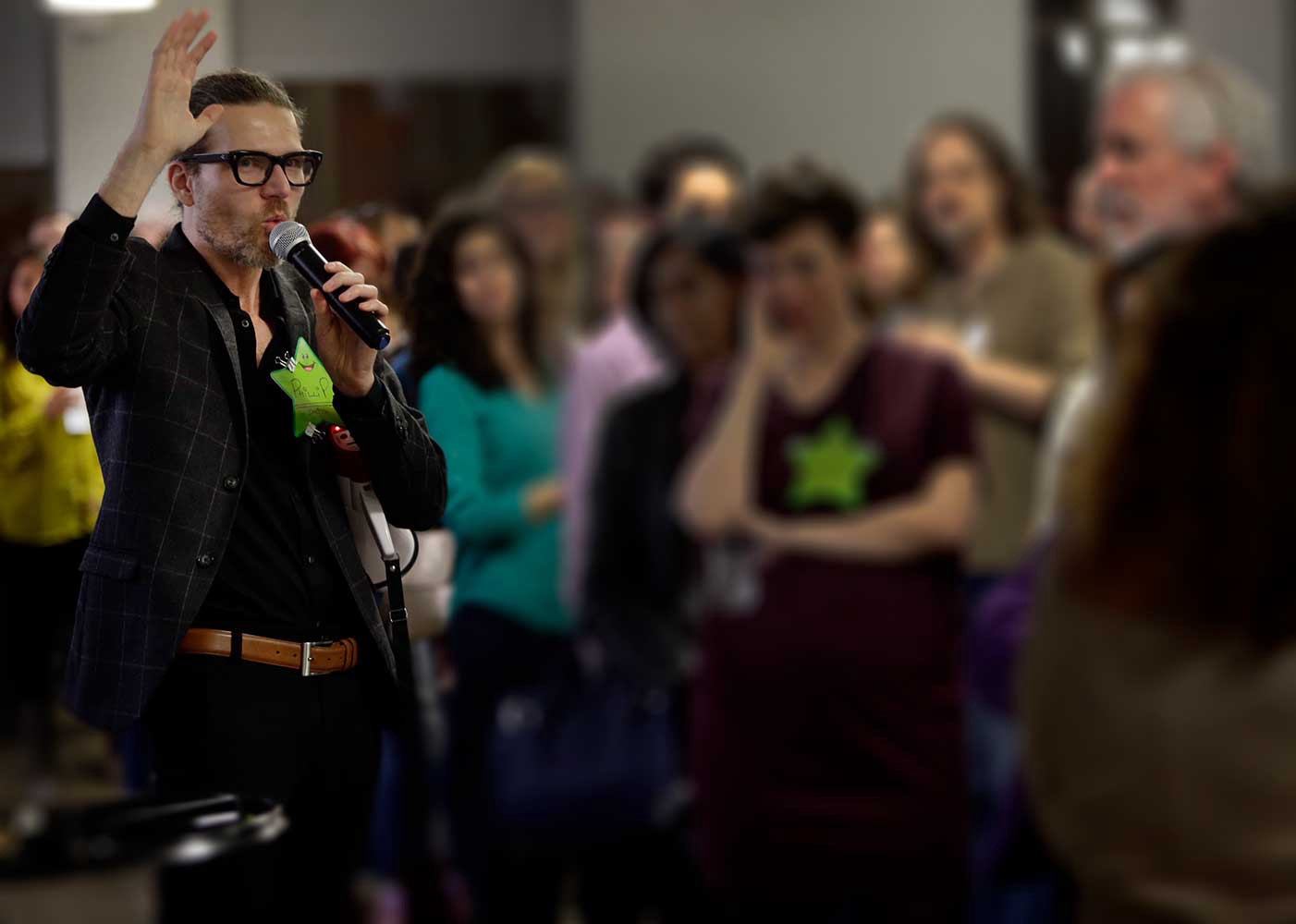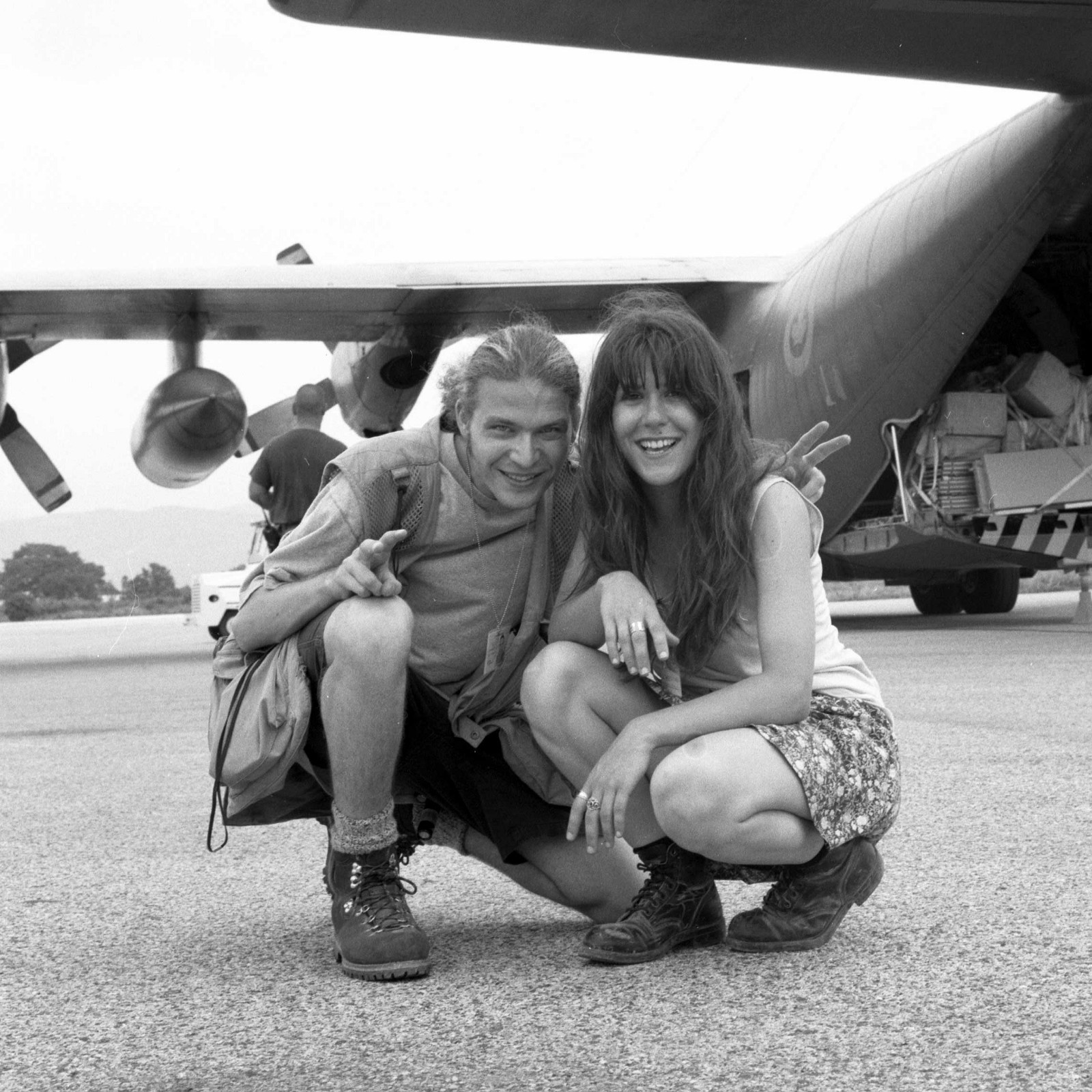Consulting, convening, coding, covering new ground, plus occasional commentary.
convening
Announcing a new journalism entrepreneurship boot camp: Let's reboot the media together
Go from idea to customers in just 10 weeks
(Scroll down to continue reading)
It’s June and the summer is just getting started in Berlin – there’s sunshine everywhere and the Berliners are out in the streets. But here I am in a dark, dance-club like room in the basement of The Factory – Berlin’s newest startup epicenter – with a hundred people that I’ve convinced to be here for an entire weekend.
Rob Wijnberg, the co-founder of De Correspondent, finishes his keynote talk on stage – I’ve flown him to Berlin because his newsroom just completed the most successful journalism crowdfunding campaign in the world – and I’ve put him here in a room full of aspiring journalism entrepreneurs. His interviewer, Anita Zielina, Chief Product Officer for Neue Zürcher Zeitung, has just opened the conversation up for audience questions and … crickets. Utter silence.

Rob and his team have raised $1.3 million in just 8 days from more than 15,000 people who are soon-to-become De Correspondent members. He’s here in the flesh, demonstrating one viable alternative model for public-service journalism, and a room full of journalists, designers, engineers and entrepreneurs have no questions. (A few questions did surface after one of those long, awkward silences, but you get the idea.)
So, what happened?
Here were hundreds of journalists who wanted to know how to create viable businesses around their work, but they didn’t know where to start. The people I met were hungry for information, tools, and mentoring, but it had to be right-sized for what they were hoping to do and the stage they were in at in that moment.
The De Correspondent model was simply too big to be directly relevant to their situation – that is, often working in a traditional newsroom and just starting to think about these ideas, or freelancing and wanting to get off the hamster wheel to focus on reporting stories that they have a passion for.
Maybe you know someone like that? If so, you might want to share this post with them, because I’m going to tell you, and your colleagues, where you can start.
Thanks to a unique partnership between Google News Lab and Hacks/Hackers Foundation, I was able to explore the question of “where to start” over and over again. At each event I pushed our team to iterate. I re-mixed concepts from design thinking and the Lean Startup movement. And at each event we tested these new ideas with a new batch of participants. And I believe we found a formula that works.

I’ve stayed in touch with many of the journalists who attended these events. They often reach out to tell me about their new enterprises – a company that makes bots for news, a new podcast about women and leadership, a new engagement metrics tool for newsrooms, and so many more. They tell me the information, tools, and mentoring we delivered really helped them get to the next step.
I believe that this approach to mentoring works so well that I’ve decided to turn it into an 8-10 week online “journalism entrepreneurship bootcamp.”
It’s custom-made for experienced journalists of all stripes who are ready to embark on starting their own enterprise. Specifically, this will be fine-tuned for people who are ready to create a viable business that undertakes reporting, or produces information. You heard it here first. And you can signal your interest today.

In the two years since those events, I’ve leveraged my network to talk to every person I could who’s involved with an accelerator, incubator, or entrepreneurship training program of some kind. I’ve attended webinars and workshops. I’ve scoured the Internet for every resource that exists on what makes entrepreneurship programs effective. And, over the past 10 months, I’ve eavesdropped on the experiences of people involved in the myriad startup programs here at Stanford. All the time asking myself one question: How might I translate this experience in a deeply-meaningful and highly-effective way for journalists who want to start their own enterprise?
Here’s the good news: I believe I’ve figured out enough of the answers to that question to package them up and bring them to life as an 8-10 week online bootcamp. And I’m looking for a few passionate reporters to help me pilot the program.
You should consider this bootcamp if:
-
You feel inspired to do more of the reporting that you care about (or you feel desperate to get out of your current situation so that you can focus on reporting that matters)
-
You believe you’ve seen a market opportunity such as the loss of your local paper, or a segment of customer that are not currently served with good journalism
-
You’re a naturally curious person, and you’d like to explore how to co-create with a community and to offer ways for people to contribute their expertise
-
You’re a born skeptic and have a deep-seated need to verify information, including your own assumptions
-
You’ve got hustle, i.e., You’re willing put in the time* and energy to build a business around your reporting (*at least part-time hours; ideally a full-time commitment)
The basics of everything else will be covered in the curriculum itself.
Of course, you might be asking “What will this cost me?” That’s a great question. To be candid, I’m still experimenting with the pricing… but here’s what I’m going to commit to for now: If you apply and get accepted into the pilot, and you attend every session – you give it 110% – it will cost you nothing but your time*.
(I’m serious. I’ll charge you an “accountability fee” up front, but if you take this as seriously as I am committing to, you’ll get that back on completion of the bootcamp.)*
I hope that people will compare the value of this online bootcamp to months of personal coaching, which could easily cost thousands of dollars. My aim is to get you to your first customers months faster than doing it on your own (what’s the value of an extra month of time?).
With that out of the way, let me share with you a few of the concrete details:
-
Part pre-accelerator and part leadership academy, this journalism entrepreneurship bootcamp will move you from an idea to your first customers in just eight weeks. It will give you the essential skills you need to start a viable reporting business. All sessions will be live and online (and recorded for later viewing) so you can attend from anywhere (and, if necessary, squeeze it in around the edges of a day job). You’ll also get a one-on-one session each week.
-
There will be an optional pre-week for those participants who are committed but have not developed an idea yet. This pre-week will provide hands-on support in brainstorming, ideation, and classic design thinking approaches to tackling a large, loosely-defined problem space.
-
The eight-week curriculum will be followed by an optional “open journalism leadership academy.” The concept of open journalism is analogous to public-powered journalism and engaged journalism: bringing lessons from the open-source software movement – co-creation, community idea solicitation, value exchange, and building networks around common interests – into the world of reporting.
And the most important detail is that you can take the first step today.
The pilot will launch in early fall. And right now I’m looking for a few brave and passionate journalists to be the first participants. If you’re ready to start work building the job of your dreams, where you can be your own boss and work on stories that matter to your community, you should apply for the pilot and make that dream a reality.
If you’re just dipping your toes in the water, sign up for updates and – after we’ve stress-tested the curriculum, format, and infrastructure this fall – we’ll start accepting applications for the public program launch in the spring of 2019.

Like many people, I battle with imposter syndrome – it’s an epic fight! – and often ask myself “Why am I the person to lead this?” In those moments, here’s what I remind myself:
-
I’ve led a twenty-year career as a tech and business entrepreneur. (After a very short career as a photojournalist.)
-
Over the past decade, I’ve mentored more than a dozen reporter-led startups to help them build a path to sustainability, and I’m excited to bring those experiences to bear on a new generation of journalism undertakings.
-
In partnership with Google News Lab, I spent two years travelling the globe producing high-value experiences for aspiring media entrepreneurs. You can get a sense of the events here and here.
-
Working with Mozilla, I kickstarted an innovative fellowship program focused on bringing the concept of open journalism to newsrooms like Al Jazeera, BBC, Boston Globe, Guardian, and Zeit Online.
-
I was the CTO of an award-winning local online newsroom, were I built successful crowdfunding campaigns from the ground up (including the technology before platforms like Kickstarter or Patreon were available).
-
I launched the Uncharted Journalism Fund, a philanthropic initiative that has made thousands of dollars in grants to encourage adventurous journalism initiatives in or about British Columbia.
And, last but not least, I’ve had the profoundly-unique opportunity to invest the last 10 months of my life into refining these experiences, ideas, and learnings here at Stanford University.
As a JSK Fellow, I’ve been able to test these ideas on a cohort of brilliant journalists and advisors. And now I’m putting it all together so that I can deliver it to you as the most profoundly-impactful, hands-on workshop you’ve ever experienced.
In a nutshell, you’ll learn how to:
-
Forecast your business using a “minimum success criteria”
-
Ditch a business plan and describe your business on one page
-
Build a three-month plan and a roadmap of how to get there
-
Understand your community’s needs, and how your project will meet those needs
-
Run small experiments to prove your idea
-
Know which technology and tools are the best fit for your undertaking
-
Build a “continuous innovation” mindset and toolkit that will keep your project relevant for years to come
Most importantly, you will find real, paying customers. That probably sounds scary, but it is the first step to building a viable reporting business. And I’ll be there to walk you through each and every step along the way.
I remember sitting at my desk back in 1998 and picking up the phone to call the director of marketing at Yahoo Canada. I wanted to sell her a full-page advertisement in an upstart literary magazine that I was involved with. I was no stranger to sales, having co-founded two businesses at this point in my life, but this was the first time I was selling a product not a service.
I was nervous as hell.
After five minutes of conversation about Yahoo’s marketing objectives she politely declined my offer. I was crestfallen.
But here’s the really surprising thing that happened: I called back the next day and explained that I couldn’t understand how Yahoo would want to miss an opportunity like this to reach a young, hip, literary audience … and not only did she agree with my assessment, but she also took out the ad in full colour at twice the cost.
To add to my surprise, she also offered me a job on the spot.
Those were important early lessons for me, and they’ll be equally important for anyone from the field of journalism who wants to pursue an entrepreneurial path – specifically:
-
Being able to pick up the phone and talk to customers;
-
Being able to listen deeply to those customers and hear what problem they’re struggling with (in the Yahoo case, reaching the right audience);
-
And being fearless about reaching out to those customers again when you believe that you have a solution that meets their needs.
And that’s exactly what this bootcamp will do – it will give you the tools to understand your community (your customers) better, to continuously experiment with meeting their information needs, and to create enough value that those customers are willing to pay for your product.
I can’t tell you how excited I am to be launching this new undertaking. It’s been several years in the making because I wanted to make sure it was custom-tailored to the needs of very early stage journalism entrepreneurs – people like you who are wanting to take the first step toward “rebooting the media” and starting a vibrant new, bottom-up community-focused media ecosystem.
If you’re ready to get to work, you can get started today. And if you’re thinking of someone you know who would be interested in this opportunity, please share this post with them. If you have questions, please drop me a line or pop them into the comments below.
Onward,
Phillip.
Journalism Entrepreneurship Boot Camp, Founder
Stanford JSK Fellow, 2017–18
About
Hi, I'm Phillip Smith, a veteran digital publishing consultant, online advocacy specialist, and strategic convener. If you enjoyed reading this, find me on Twitter and I'll keep you updated.

Related
Want to launch a local news business? Apply now for the journalism entrepreneurship boot camp
I’m excited to announce that applications are now open again for the journalism entrepreneurship boot camp. And I’m even more excited to ...… Continue reading
Previously
A journalism innovation and entrepreneurship reading list
From the future
Why journalism entrepreneurship is needed